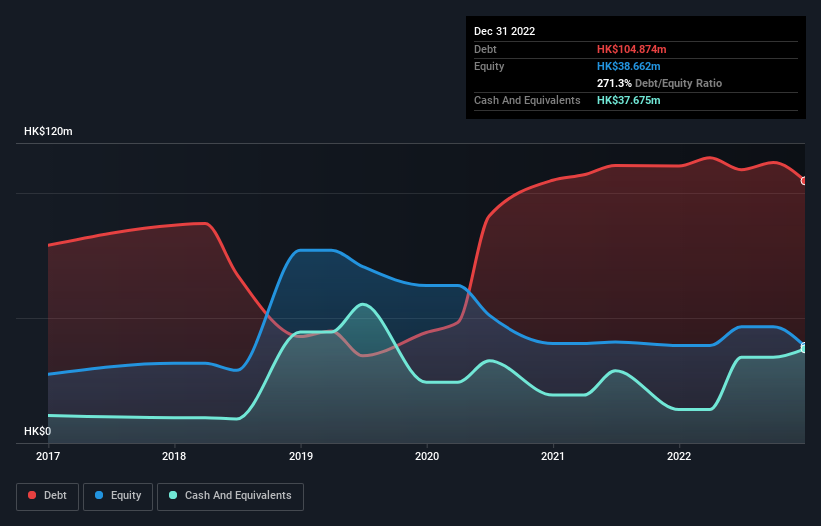Is Hanvey Group Holdings (HKG:8219) Weighed On By Its Debt Load?

Legendary fund manager Li Lu (who Charlie Munger backed) once said, 'The biggest investment risk is not the volatility of prices, but whether you will suffer a permanent loss of capital.' So it might be obvious that you need to consider debt, when you think about how risky any given stock is, because too much debt can sink a company. We note that Hanvey Group Holdings Limited (HKG:8219) does have debt on its balance sheet. But the more important question is: how much risk is that debt creating?
When Is Debt A Problem?
Debt assists a business until the business has trouble paying it off, either with new capital or with free cash flow. In the worst case scenario, a company can go bankrupt if it cannot pay its creditors. However, a more usual (but still expensive) situation is where a company must dilute shareholders at a cheap share price simply to get debt under control. By replacing dilution, though, debt can be an extremely good tool for businesses that need capital to invest in growth at high rates of return. The first step when considering a company's debt levels is to consider its cash and debt together.
Check out our latest analysis for Hanvey Group Holdings
What Is Hanvey Group Holdings's Net Debt?
The image below, which you can click on for greater detail, shows that Hanvey Group Holdings had debt of HK$104.9m at the end of December 2022, a reduction from HK$110.8m over a year. However, it also had HK$37.7m in cash, and so its net debt is HK$67.2m.

A Look At Hanvey Group Holdings' Liabilities
Zooming in on the latest balance sheet data, we can see that Hanvey Group Holdings had liabilities of HK$150.9m due within 12 months and liabilities of HK$56.1m due beyond that. On the other hand, it had cash of HK$37.7m and HK$31.1m worth of receivables due within a year. So it has liabilities totalling HK$138.2m more than its cash and near-term receivables, combined.
This deficit casts a shadow over the HK$59.4m company, like a colossus towering over mere mortals. So we definitely think shareholders need to watch this one closely. After all, Hanvey Group Holdings would likely require a major re-capitalisation if it had to pay its creditors today. There's no doubt that we learn most about debt from the balance sheet. But it is Hanvey Group Holdings's earnings that will influence how the balance sheet holds up in the future. So if you're keen to discover more about its earnings, it might be worth checking out this graph of its long term earnings trend.
In the last year Hanvey Group Holdings wasn't profitable at an EBIT level, but managed to grow its revenue by 33%, to HK$273m. With any luck the company will be able to grow its way to profitability.
Caveat Emptor
While we can certainly appreciate Hanvey Group Holdings's revenue growth, its earnings before interest and tax (EBIT) loss is not ideal. Indeed, it lost a very considerable HK$6.5m at the EBIT level. When we look at that alongside the significant liabilities, we're not particularly confident about the company. We'd want to see some strong near-term improvements before getting too interested in the stock. It's fair to say the loss of HK$11m didn't encourage us either; we'd like to see a profit. In the meantime, we consider the stock to be risky. There's no doubt that we learn most about debt from the balance sheet. However, not all investment risk resides within the balance sheet - far from it. To that end, you should learn about the 4 warning signs we've spotted with Hanvey Group Holdings (including 3 which are concerning) .
If, after all that, you're more interested in a fast growing company with a rock-solid balance sheet, then check out our list of net cash growth stocks without delay.
Valuation is complex, but we're here to simplify it.
Discover if Hanvey Group Holdings might be undervalued or overvalued with our detailed analysis, featuring fair value estimates, potential risks, dividends, insider trades, and its financial condition.
Access Free AnalysisHave feedback on this article? Concerned about the content? Get in touch with us directly. Alternatively, email editorial-team (at) simplywallst.com.
This article by Simply Wall St is general in nature. We provide commentary based on historical data and analyst forecasts only using an unbiased methodology and our articles are not intended to be financial advice. It does not constitute a recommendation to buy or sell any stock, and does not take account of your objectives, or your financial situation. We aim to bring you long-term focused analysis driven by fundamental data. Note that our analysis may not factor in the latest price-sensitive company announcements or qualitative material. Simply Wall St has no position in any stocks mentioned.
About SEHK:8219
Hanvey Group Holdings
An investment holding company, designs, develops, manufactures, and distributes watch products on an original design manufacturing basis in Hong Kong and the People’s Republic of China.
Slight and slightly overvalued.
Market Insights
Community Narratives




